As a retrospective, Nepali Times brings a selection of opinion columns from the past 600 weekly editions of the paper since May 2000 during which the country went from constitutional to absolute monarchy, suffered a war and a royal-military coup, saw a ceasefire, an interim government, the election of Maoists to power and the peace process.
The Kathmandu spring
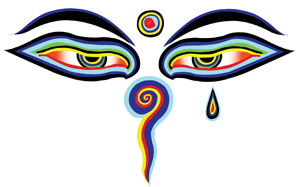 |
Since peace has begun to reign inside the Ring Road, life is so normal that even a man biting a dog doesn't make news anymore. The consternation of reporters and editors is understandable.
Due to rationed news and censured views in the public domain, it's no longer necessary for us to whack our brains with the lessons of the past, put them in perspective with experiences of the present and then risk being proved wrong by trying to predict the future. It's much safer to navel-gaze and shoot off another column befitting the ground reality.
Outside the valley, newspapers have been asked to keep mum for a while so that their freedom can be protected. And some human rights activists and journalists have been taken into preventive custody to protect their life and liberty.
In the capital, journalists are enjoying unprecedented levels of freedom of expression. Cartoonists have the liberty to lampoon any party leader of their choice. There is no restriction on lambasting the misdeeds of Girija Prasad Koirala, ridiculing the stupidity of Sher Bahadur Deuba or satirising the insatiable greed of Madhab Kumar Nepal. The less said about the excesses of their acolytes in the press the better. Many opinion-writers, like this scribe here, have already started exercising these unfettered freedoms.
Freedom of civil society to welcome royal proclamations knows no bounds. People are free to stage flag-waving motorcycle rallies in defiance of a ban on demos, take out peace marches and shout slogans against corrupt leaders. Surely, no peace-loving citizen in an insurgency-torn kingdom could ask for anything more.
Businessmen, wilful defaulters, wheeler dealers and movers and shakers have discovered that they have full freedom to place colourful ads in daily newspapers welcoming February First. This has a multiplier effect: it infuses cash into hardup media houses that haven't paid salaries to staff for months. The guardians of the national interest are now free to scoff at the international community who have been mindlessly voicing concerns for peace, democracy, and human rights in clear violation of our sovereign right to do whatever we want.
Plato said the human soul is a chariot pulled by the two horses of reason and emotion. Reason demands that we learn to live in the present. Emotion dictates that we take the help of music to endure the unendurable. Perhaps that's the reason local FM stations have been told: "No news, no views, no analyses, no discussions, only music." Thank god for these small mercies.
CENSORED
 |
Page 2-3 of the Nepali Times #234 of 11-18 Feburary 2005 after the military imposed direct censorship on the media. Soldiers entered the newsroom and would expunge content deemed objectionable before the paper went to press. A cartoon that was taken out from the op-ed showed a tear drop below the rainbow eyes of the Buddha. CK Lal's State of the State column was censored in its entirety, and the editors replaced it with the picture of a ten-day old baby who was born at the exact moment of king Gyanendra's coup on 1 February 2001. Even a letter to the editor was taken out.
All the news that is fit to print
In his Under My Hat column, Kunda Dixit satirised the clampdown on the press and the column itself was censored in the #234 edition of Nepali Times of 11-17 February 2005.
Statutory Notice: An official fact-finding Committee has pre-tested this column on lab animals and certified that it contains permitted synthetic dyes and preservatives and has declared it fit for human consumption provided the childproof seal is not broken at the time of purchase. However, one can't be too careful during these perilous times so readers are advised to exercise individual caution on a case-by-case basis. Management is not responsible for the consequences, especially if perpetrators are apprehended perusing this in broad daylight, charged with indecent exposure, and sentenced to 36 lashes with a wet rattan cane on each hind cheek.
Now that we have those legal niceties out of the way, we can get down to what you have all been impatiently waiting for with barely-concealed boredom, which is a roundup of this week's main events.
Leaders Irked by Continued Freedom
Political leaders and activists who have not been taken into custody have complained that they are still free to roam around the streets.
"It's been a week and they have still not put me under preventive detention," complained a Nepali Congress leader on condition of anonymity, "This is discrimination, what do I have to do, burn some more tyres?"
A multi-partisan group calling itself the All-Nepal Federation of Unjustly Undetained Politicians threatened to launch a decisive nationwide stir if their demand to be arrested without further ado is not implemented with immediate effect by the concerned higher-up authority.
The statement said: "If they don't put us under house arrest, then we'll go into cardiac arrest."
ATTACKED
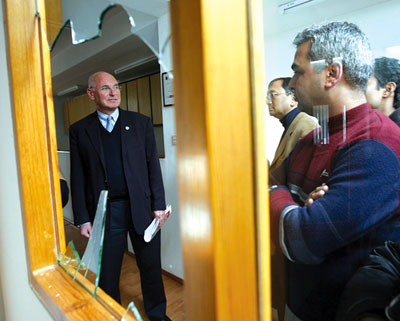 |
The office of Himalmedia was attacked and vandalised by Maoists on 23 December 2008 in retaliation against a cover story in Himal Khabarpatrika, the sister publication of Nepali Times, about the Maoist militant union extorting and attacking businesses. Among those who visited the Himalmedia office in Hattiban to express solidarity was UNMIN chief, Ian Martin (left).
 SUBHAS RAI #161 NEPALI TIMES |
Bandhonomics
Artha Beed's Economic Sense column from Nepali times #90 of 19-25 April 2002 about the epidemic of bandas.
In Nepal as in other South Asian countries, all parties that have come to power, or even remained in opposition, have used bandhs effectively and institutionalised it with the necessary ingredients of violence, coercion and fear. This is why even a banda called by an otherwise obscure association or group of people is scary and so vehicles remain off the roads, shutters are down and all institutions are closed.
Many keen observers of our glorious way of life insist that bandhs are so successful in Nepal because they fit in perfectly with a core characteristic of the Nepali psyche-evading work. Although methinks this is an overly cynical, possibly even defeatist position to take, it is true that bandhs are often openly discussed in terms of being a windfall break, especially for people in government, when one signs the attendance register, to be sure, but follows that by simply sitting back for a fun-filled day with exciting card games, endless cups of tea, naps and a few discreet moments of personal grooming. On a bandh, even government civil servants, what an ironic description, at the highest level make no attempt to either work themselves or make sure that others do too.
Underbelly of the beast
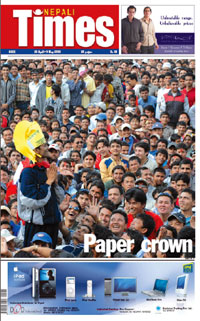 |
DUWAKOT-Taken in by Kathmandu's royal regime with two dozen other protesters last week for willfully (and with prior announcement) breaking the curfew order, this writer had an opportunity to see how a 'militarising' autocratic state machinery can ride rough-shod over some of the weakest members of society. It was an opportunity to take a look at the underbelly of the monster that the government can be. What we have seen during our incarceration is something that the privileged with contacts in high places or money to buy oneself safe passage rarely care to see or understand.
Four kids were resting inside a bus at a bus stop where they work as cleaners when they were dragged out: Dhruba Timilsina, 17, of Hetuada, Buddha Lama, 16, of Sindhupalchok, Ramesh Thapa Magar,17 and Ram Lama, 20, of Chapagaon. They have all been moved elsewhere. Individuals who are in the lowest class bracket in detention get the toilet that is furthest and the rice that is the worst. It will be important for the ICRC to determine their fate and whereabouts.
Duty in distress
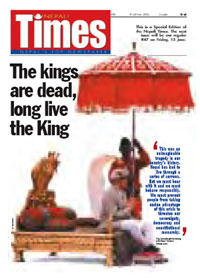 |
Column by Hari Roka in the aftermath of the royal massacre in the 6 June 2001 edition of Nepali Times #46.
It may be too hasty to hope that the Peoples' War being waged by the Communist Party of Nepal (Maoist) against the whole system for over half a decade would provide a new path for the nation. The insurgency has helped push the nation further into confusion and disarray. It is not possible to expect this power to steer the nation away from the current crisis, since it is difficult to gauge how organised the movement is.
Trapped between the structurally underdeveloped political groups and the political confusion and anarchy they themselves have created, the biggest tragedy in the history of the country occurred in the royal palace on the night of 1 June, 2001. This incident and the events that followed it have destabilised the palace, which was perceived to be a solid and monolithic structure for more than 250 years. This last week has pushed the nation into an unprecedented dilemma and crisis. The Nepali nation is bewildered and alarmed.
At this moment of unstability and lawlessness, many may be tempted to fish in muddy waters. But doing so would only invite more grief to the people and the country. Events in the world and in neighbouring countries have already demonstrated that during times of such uncertainty, reactionary forces from inside as well as outside will try to push nations towards the precipice.
The insurgency's human face
Barbara Adams wrote these lines in her Barbara's Beat column in the 11-17 May 2001 #44 edition of the Nepali Times, just before the royal massacre.
The new Plan to defeat the Maoists is supposed to win the "hearts and minds" of Nepalis, but this slogan which might have made sense three-and-a-half years ago when it was rejected by Girija Koirala, is a joke today.
The Maoists have already won the hearts and minds of much of Nepal including many intellectuals in Kathmandu. If the prime minister thinks the way to win over the villagers is to send more and more force to shoot through the hearts and blow out the minds of Maoists or their sympathisers, they today understand even less than they did three years ago when they launched Kilo Sierra II. One only needs to look at the same discredited faces who still surround and advise the prime minister, and who have presumably concocted another exercise in killing, to realise why this plan is doomed to failure.
It is now becoming more and more apparent that the process of creating a peaceful and socially just Nepal can only begin with a departure from the political scene of Koirala and his self-serving entourage.
One year itch
The late Saubhagya Shah wrote a regular Guest Column, and this one is an excerpt from the #41 edition of Nepali Times 23-29 March 2007.
There must be something in our national psyche that makes the Nepali mood swing so swiftly between irrational exuberance and incorrigible pessimism. Much has happened politically in the past year that has generated immense enthusiasm for the future. The whole state machinery, the political parties, civil society, and regional and ethnic forums had begun to focus their energies on the task of holding the elections to the constituent assembly. For a moment it seemed as if we could all live together happily ever after.
Alas, except for just the small matter of the South that had been forgotten during the celebrations. The sudden violence that engulfed the eastern Tarai left April's triumphant paradigm in tatters. There was the sight of mighty leaders and their auxiliary intelligentsia first dismissing the Madhesi uprising as the handiwork of a few miscreants, then threatening the use of force to put out fires supposedly ignited by fundamentalists and reactionaries, and finally making a 180-degree turn to embrace the same revolt as their own - all within a week.
Murkier and murkier
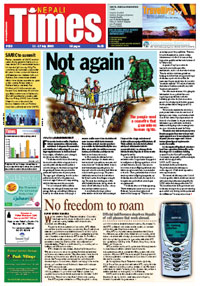 |
The main enemies of the Madhesi people are the present Madhesi leaders themselves. It is now increasingly apparent that the second Madhesi movement of January-February happened only to generate a support base and ensure political survival for the three parties. Their demands (undefined autonomy, self determination) did little to help ordinary Madhesis. The promise of inclusion had already been made earlier, and was only reiterated. All the three-week agitation did was channelise Madhesi discontent, and generate a wave. But in less than a week, the Madhesi parties blew it all away.
Thapadom
Manjushree Thapa in this column from #149 of Nepali Times 13-20 June 2003 pokes fun at the return of the days of the Thapas.
Till last week, the Thapas merely headed only the Royal Nepal Army (Pyar Jung Thapa), the Nepal Police (Shyam Bhakta Thapa) and the Armed Police Force (Sahabir Thapa, who is of Magar origin unlike the others, all Chettri Thapas).
Now Surya Bahadur Thapa has become the prime minister for the fifth time in his life-not counting his chairmanship of King Mahendra's advisory council in 1958. The last time there were so many Thapas in government, the Panchayat regime collapsed under their weight.
What do non-Thapas make of this? Mostly they are too tactful to say anything, not wanting to engender caste disharmony, though the republicanists among them do secretly wonder if the weight of Thapas will now lead to another regime change. The Bahuns, who are sick of being blamed for everything that has gone wrong in the past 12 years, breathe easier now that they can point out the Chettris, who did after all govern Nepal for the entire period preceding 1990.
The Thapas themselves are quietly exhilarated, discussing at family gatherings the infinite kinship lines that ultimately-by marriage, over generations, many times removed-connect them all to each other. In the end a Thapa is a Thapa unless he is a Magar Thapa, in which case he should consider changing his name or at least tacking on a nom de guerre.
So: The Nepali state has dismally failed to be inclusive. What, other than this, is there to say? The Chettri Thapas are back in control of the court. Break out the Khukuri Rum.


